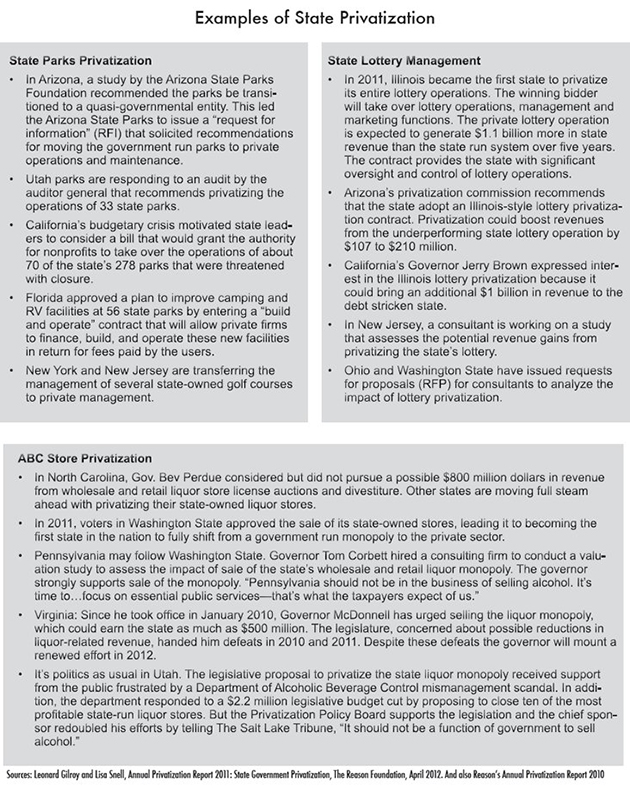Publisher's note: Agenda 2012 is the John Locke Foundation's charge to make known their wise political agenda to voters, and most especially candidates, with our thirty-third instalment being "Privatization," written by Dr. Michael Sanera, Director of Research and Local Government Studies at the John Locke Foundation. The first installment was the "Introduction" published here.
Privatization is an umbrella term to describe techniques that increase competition in the public sector. Private sector entrepreneurs must constantly look for ways to cut costs and improve efficiency to maintain a competitive advantage. State agencies, on the other hand, are often the only service provider or, when there is competition with the private sector, they have unfair access to taxpayer funds. State agency personnel secure agency income, not by satisfying customers, but by satisfying special interest groups who lobby for and legislators who pass their agency budgets. Taxpayers and citizens alike benefit from privatization through lower costs and improved quality of services.
Types of Privatization
Competitive sourcing uses a bidding process to allow private sector service providers to compete with public sector agencies. Existing state workers submit a bid as do private companies. The lowest bid receives the contract.
Public Private Partnerships (PPP) are joint ventures between public agencies and private firms to provide services or perform functions. PPP is commonly used in construction. Private toll roads can be built to state specifications with users paying the costs. After a time, the road usually reverts to state ownership.
Contracting out involves the public sector contracting with private or non-profit firms to deliver a service that previously was provided by a government agency. The government maintains control through the terms of the contract. Common examples are DMV drivers' license testing, food service in schools and prisons, parks management, and wastewater treatment. The N.C. Department of Corrections currently operates four minimum-security prisons using contracts with private firms.
Asset sales are a way for governments to increase revenues by shedding nonessential property or commercial-type enterprises. Governments have sold buildings and then leased back needed space. The budget crisis in California has prompted the state to consider selling the LA Coliseum, San Quentin Prison, and a number of state fairgrounds. Estimates of asset sales (also called divestiture) in California range up to $1 billion.
State-Level Comprehensive Approaches
The most effective way for North Carolina to save money through privatization is to create an independent body to recommend and manage state privatization efforts. Recent successes in New Jersey, Louisiana, Ohio, and Arizona are added to those of a long list of states that have proven the cost savings of privatization of state activities
Key Facts
•
New Jersey Governor Chris Christie is implementing privatization recommendations from the N.J. Privatization Task Force. It is estimated that 40 recommendations, if fully implemented, will save over $210 million dollars through such policies as privatizing highway maintenance, state parks, toll road collections, lottery, and correctional food service.
•
Louisiana's Commission on Streamlining Government (CSG) provided Governor Bobby Jindal with 238 privatization recommendations estimated to save state taxpayers $1 billion -- from privatizing Medicaid services and the public employee health care system to the sale of three prisons.
• In
Ohio, Governor John Kasich moved to privatize the state's economic development functions. Passage of a February 2011 bill created JobsOhio, a semi-private, nonprofit organization to take over the economic development functions of the Ohio Department of Development. In addition, the state is moving toward the sale of at least one prison and private management of others, private management of the state lottery, and a long-term lease of the 241-mile Ohio turnpike.
•
Arizona has fine-tuned its privatization process concentrating on institutionalization of privatization rather than one-time fixes. The state Commission on Privatization and Efficiency (COPE) recommends that the state move to activity-based costing program and statewide outcome-based budgeting. COPE also recommended a process to provide systematic review of agencies, boards, and commissions looking for elimination, merger, and privatization.
Recommendation
The General Assembly should adopt a comprehensive privatization strategy by creating a Council on Efficient Government.
Analyst: Dr. Michael Sanera
Director of Research and Local Government Studies
919-828-3876 •
msanera@johnlocke.org

























